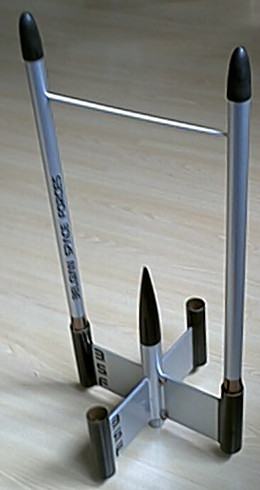| Manufacturer: | Scratch |
by Michel Demey

|
This rocket is build mostly using the parts from the contest's list. I had no gemini rocket available. The material comes from a pegasus rocket for the bt-50 tubes and the motor mount, and the 18mm tubes are full length of spare bt-20 tubing. Yes this is one bt-20 more than in the kit, but I wanted to be sure that the rocket will be stable without being able to test it in rocksim due to the unusual configuration. I had no 18mm estes nose cone so I replaced them by hard wood nose cone that I had in stock. ConstructionThe main body tube is 120mm of bt-50.Build the motor mount using the parts of the kit and glue it so it protrude about 20mm out of the back of the main body tube. Each fin is a rectangle 70mmx80mm, glued small side on the main tube. Each fin pod is 100mm of bt-50. The two lateral bodies are 400mm of bt-20 each. You can glue the nose cones on the lateral tube. There is no ejection of them. When I started the construction, I wondered if the rocket will sustain the acceleration without disintegrating itself. The two bodies are glued at the end of the fins and this will add accelerations forces at the root edge of the fins. So I reinforced the root edge joins with a fillet of epoxy glue. In addition, a small dowel is glued at the nose cone end of the bodies to prevent them to split apart. The parachute is ejected from the main tube. Since his length is only 100 mm, the plastic nose cone shoulder is cut to make a place for the parachute. I hate to paint. The rocket is entirely covered with oracover (sort of monokote).
|
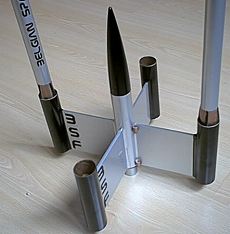 |
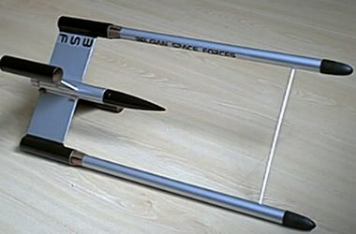 |
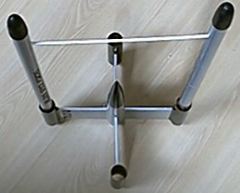 |
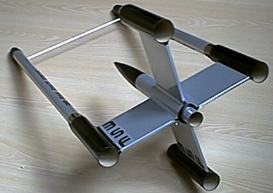 |
FlightThe weight of the model is about 80gr.The rocket cannot be well simulated in rocksim, but with a rough model, I estimated the altitude to 70M with a B6-2 and 150M with a C6-3.
|
|
first flight
|
|
second flight
|
|
Post scriptum: the cad view has been made with pro/desktop express, a free 3d design package available on the web at www.ptc.com
 |
 |
